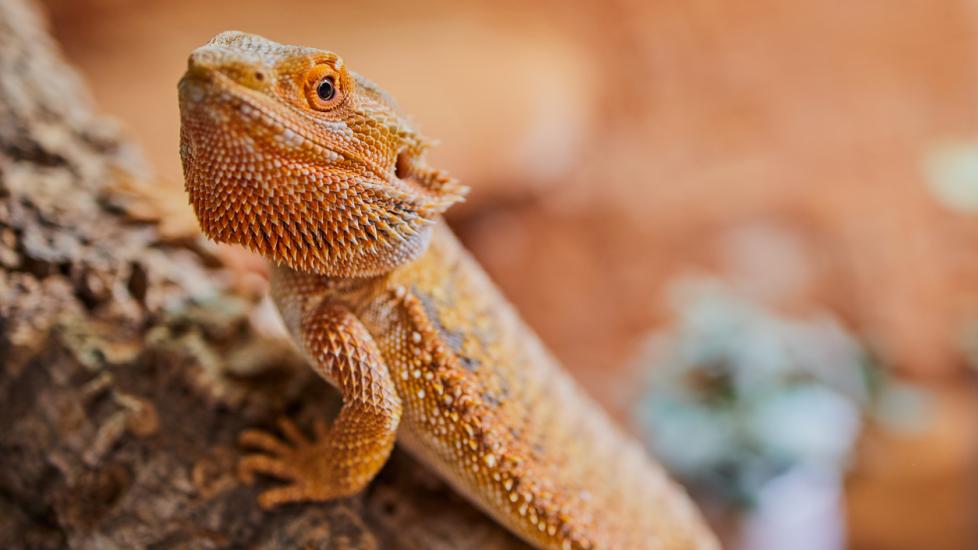How Long Do Bearded Dragons Live?
Bearded dragons are fun and gentle pets that have become a favorite for reptile owners. Like all pets, the life expectancy of bearded dragons should be carefully considered, in addition to the suitability for the household. Bearded dragons in captivity have a life expectancy of around 10 years, although the oldest bearded dragon on record lived to 18 years.
The single most important factor to keep your bearded dragon healthy and living a long life is husbandry. Husbandry is all the factors that go into the care of a pet, including feeding, lighting, temperature, veterinary care, and more.
Average Bearded Dragon Lifespan and Aging
Bearded dragons are originally from central Australia–however, it is illegal to export wild beardies today. All bearded dragons in the United States are bred in captivity. With proper care, domestic bearded dragons typically live 8-10 years. Their wild counterparts only live a fraction of that due to predation and lack of consistent food, water, and veterinary care.
Bearded dragons reach maturity between 1 and 2 years old, although some may be sexually mature as early as 6 months of age. Many bearded dragons will enter a state of hibernation called brumation during the winter months. Females may lay eggs multiple times throughout the year, and this is most often associated with rising temperatures after brumation. Clutches may have up to 20 eggs, and females will lay unfertilized eggs regardless of the presence of a male bearded dragon. Fertilized eggs will hatch between 55 and 75 days.
What Makes Some Bearded Dragons Live Longer Than Others?
Inbreeding is a big concern in bearded dragons, causing genetic issues, malformations, and deformities. Silkback bearded dragons, specifically, are a variant that were selectively bred to have smooth, not spiny, scales. This mutation can cause significant skin issues, resulting in decreased quality of life and life expectancy.
While genes may play a role in life expectancy, most life-threatening health conditions in bearded dragons are secondary to poor husbandry. Metabolic bone disease and kidney diseases are very common in improperly cared for bearded dragons, often from incorrect ultraviolet light exposure and lack of calcium supplementation.
Female bearded dragons frequently fail to produce eggs secondary to husbandry problems, as well, resulting in retained follicles that may even rupture internally. Many bearded dragons also acquire periodontal, or tooth and gum disease. Regular veterinarian visits can monitor teeth health and provide medical intervention before it causes illness.
Other common diseases stem from new reptiles being improperly quarantined. Make sure to follow a full quarantine and have any new pets vet-checked before introducing them to others in the house. Bearded dragons are typically solitary animals, unless when living with experienced reptile breeders. Overcrowded beardies may injure and traumatize each other, leading to wounds and loss of limbs.
Additionally, inadequate bathing can cause dehydration and difficulties with shedding skin. Without proper hydration, bearded dragons can have sheds constrict toes and tails, resulting in loss of that body part.
Obesity is another common problem with bearded dragons due to being fed too much and leading mostly sedentary lifestyles. Obesity leads to a multitude of health conditions, so make sure to talk to your veterinarian about a healthy weight for your beardie.
Talk to your veterinarian about the following husbandry concerns to give your beardie the best chance to live a long, full life:
-
Proper lighting: ultraviolet and heat
-
Proper temperatures with basking spot and humidity
-
Proper diet: leafy greens daily with variety of vegetables
-
Proper insect diet: gut-loaded and calcium dusted insects (dubia roaches, superworms, crickets, etc.)
-
Appropriately sized terrarium
-
Proper calcium and multivitamin supplements
-
Free access to water
How to Improve Your Bearded Dragon's Lifespan
There are many ways to improve your beardie’s health and happiness—both leading to a longer life! Always consult with your veterinarian, but general recommendations include:
-
Regular veterinary exams at least every year
-
Regular bloodwork and yearly fecal parasite testing
-
Quarantine all new reptiles upon arrival for 3-6 months while testing based on your vet’s recommendations
-
Ensure proper terrarium lighting, including appropriate temperature gradients, humidity, and accessible UVB lighting
-
Never use floor or heat mats that can cause thermal burns
-
Follow proper feeding schedules based on life stages: overfeeding can lead to obesity and other health issues
-
Feed only fresh vegetables and live, healthy insects—dehydrated insects are devoid of nutritional value
-
Supplement your bearded dragon with calcium and multivitamins
-
Examine your bearded dragon frequently for abnormalities and watch for signs of illness
-
Don’t keep multiple bearded dragons together unless planning to breed
-
Keep bearded dragons in large terrariums—at least 2-3 times their nose-to-tail length
-
Change UV bulbs every 6 months, even if they are still functioning with visible light
References
-
Johnson DVM, Jay D. Veterinary Information Network, Inc. Bearded Dragon (Pogona vitticeps) Pet Care. January 2011.
-
Pollock DVM, DABVP, Christal. LafeberVet. Basic Information Sheet: Inland Bearded Dragon. October 2018.
-
Mede CVT, Erica. Chicago Exotics Animal Hospital. Bearded Dragon Care.
-
Guinness World Records. Oldest bearded dragon in captivity ever. 2022.
Featured Image: iStock.com/Claudia Nass
